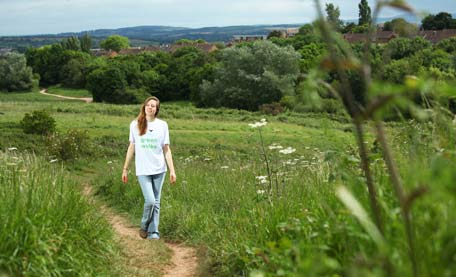Articles

Exeter Green Walks
Can spending time in parks, woodlands and beaches improve our mental health?
A new study involving the University of Exeter will investigate whether spending time in green and blue spaces, such as parks and beaches, can have a positive effect on our long-term wellbeing and mental health.
Mental health and wellbeing problems are a growing public concern. One in four people experience a mental health condition such as anxiety and depression at some time in their lives. Mental health problems cost the UK economy over £100 billion a year.
A growing body of evidence indicates that exposure to green and blue spaces may benefit mental health and wellbeing. Now, the NIHR’s Public Health Research programme, is investing in a collaboration who will explore whether green and blue spaces, such as parks and beaches, can have a positive effect on our long-term wellbeing and mental health.
The collaboration is led by experts from Swansea University, and involves the University of Exeter, Cardiff University and the Barcelona Institute for Global Health. This new funding will enable researchers to take a large-scale population approach, considering the majority of Wales’ environment and population, and changes over time.
The team of academics will work with partners from Natural Resources Wales, Keep Wales Tidy, Sports Wales, City and County of Swansea, and Welsh Government. Researchers will gather health and environment data and link them in a databank based at Swansea University (saildatabank.com). The Secure Anonymised Information Linkage databank (SAIL), is a world-class system that brings data together in a secure, trusted and confidential way. The team will consider how abundance and accessibility of different types of green and blue spaces relate to mental health and wellbeing benefits for different people.
Researchers will look at data for 1.7 million people in Wales to explore how people change their use of health services, such as their general practitioner, as their local environment changes. Because the effects of green and blue spaces take time to change health, the team will use historical data with statistical methods to assess the effects over the past decade.
Dr Ben Wheeler, leading the University of Exeter team involved in the project, said “This approach, using a ‘natural experiment’, and working across a collaboration of organisations, will allow us to produce very robust and useful evidence. This will help us to understand the potential ‘win-win’ of actions to improve and protect of both the environment and public health.”
Dr Sarah Rodgers, Associate Professor at Swansea University Medical School, is leading the team. She said: “The 24,000 people who annually respond to the National Survey for Wales tell us how often they visit green or blue spaces, where they went, what they did, and report on their wellbeing. We will test whether people who more frequently visit green and blue spaces report better wellbeing. We will be able to explore, for example, if people report better wellbeing in greener areas because they visit green and blue spaces more often and engage in more physical activity compared to those living in less green areas.”
Date: 22 September 2017
